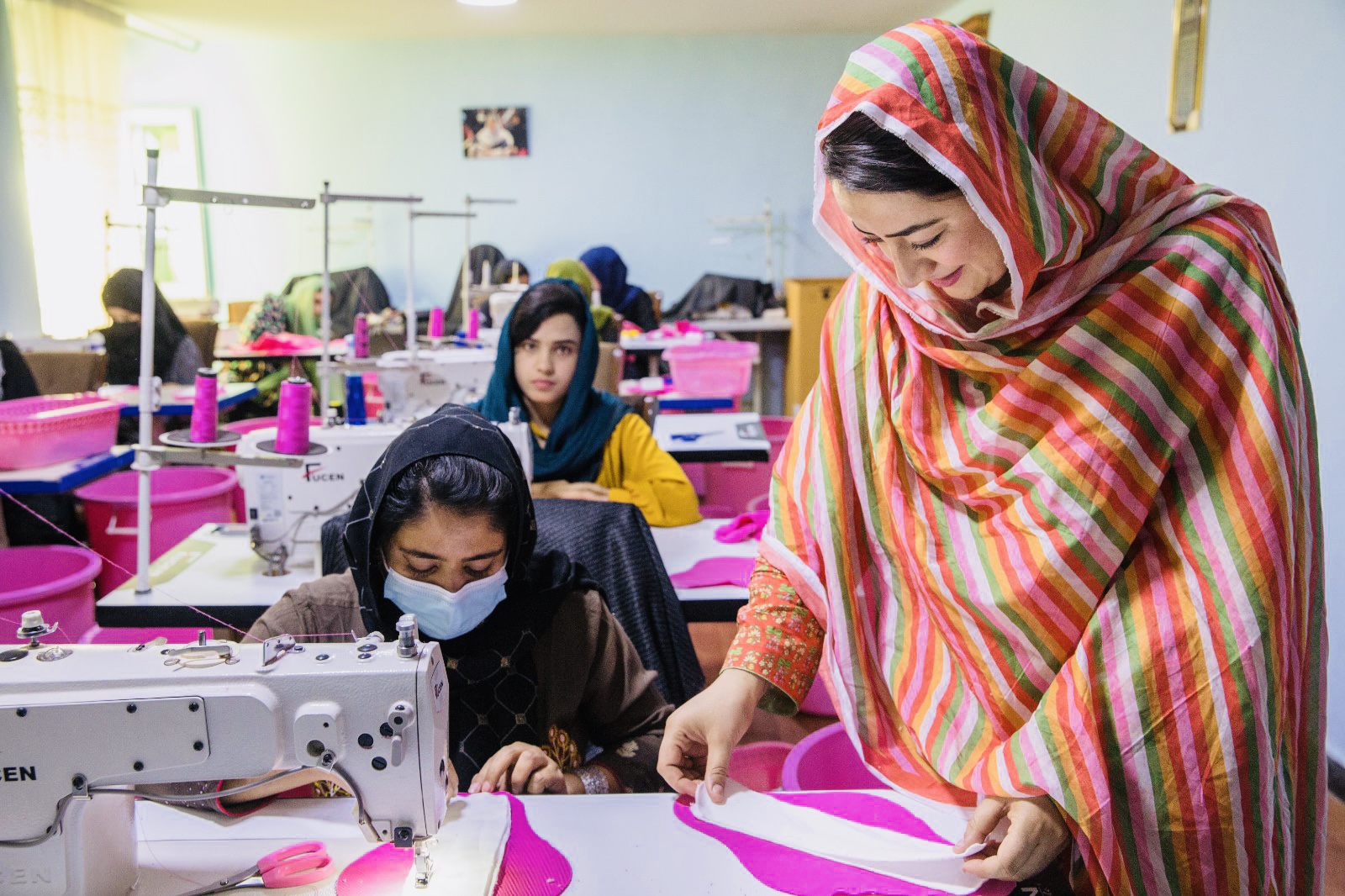
This International Day of the Girl, WLP had the honor of speaking with Zala Ahmad, advisor to WLP's Cross Border Coalitions Initiative and co-founder of Safe Path Prosperity (SPP), an incredible organization dedicated to empowering Afghan women and girls through menstrual health education and access to essential products. Operated by Afghan women, SPP produces Safepad, a locally-made reusable sanitary product, in production centers located in Kabul and Kandahar. The organization is dedicated to creating pathways to employment, prosperity, and dignity for Afghan women and girls through various initiatives, including employment opportunities, mental health support, and educational awareness programs. To date, SPP has generated over 100 jobs and distributed more than 250,000 hygiene kits to women and girls across Afghanistan. In this interview, we delve into the work of Safe Path Prosperity and the organization's vision for a future where menstruation is embraced as a symbol of health and empowerment. Read more about the inspirational work of SPP below.
WLP: This year, the theme of the International Day of the Girl centers on visions of the future, emphasizing the need for adults to support the potential of young women and girls. You articulated it beautifully in your address to the United Nations when you mentioned that you're in the business of possibility and optimism, which is so vital in today's world.
Zala: Yes, "hope" was the word I used.
WLP: With that in mind, could you share a bit about your background, growing up in Afghanistan, and what inspired you to establish Safe Path Prosperity?
Zala: I’ve dedicated much of my life to initiatives focused on girls’ education and women’s economic empowerment in Afghanistan. I owe who I am today to the education I received, a value instilled in me by my father, who always said that education is an asset that no one can take away. It is an asset that will not only help you prosper in life, but other girls as well.
I hail from Farah Province, a very remote and conservative area. While living in Kabul as a fresh undergraduate, I started working with UNESCO and visited my hometown back in 2009. There, I met some schoolgirls and realized the need for additional skills beyond what public schools offered - skills like computer literacy, business management, and English language - to prepare them for university and employment opportunities.
Education became everything for me. As the cofounder of HOLD Afghanistan, I designed and implemented programs focusing on girls’ education, civic education and human rights, and leadership. One remarkable success story is of a girl who joined our Educational Center at 12 years of age. By 14, she participated in a leadership program in India, an opportunity that seemed unimaginable at the time. Today, she’s a former fourth-year medical student and one of our employees at Safe Path Prosperity, helping to educate Afghan girls in menstrual health and hygiene (MHM).
I had worked in the development sector for many years and realized the need to combine education with economic empowerment. And, of course my passion for girls’ education and learning about period poverty [the lack of access to menstruation information and hygiene products] for girls in rural areas that negatively impacted their schooling - led to the launch of Safe Path Prosperity.
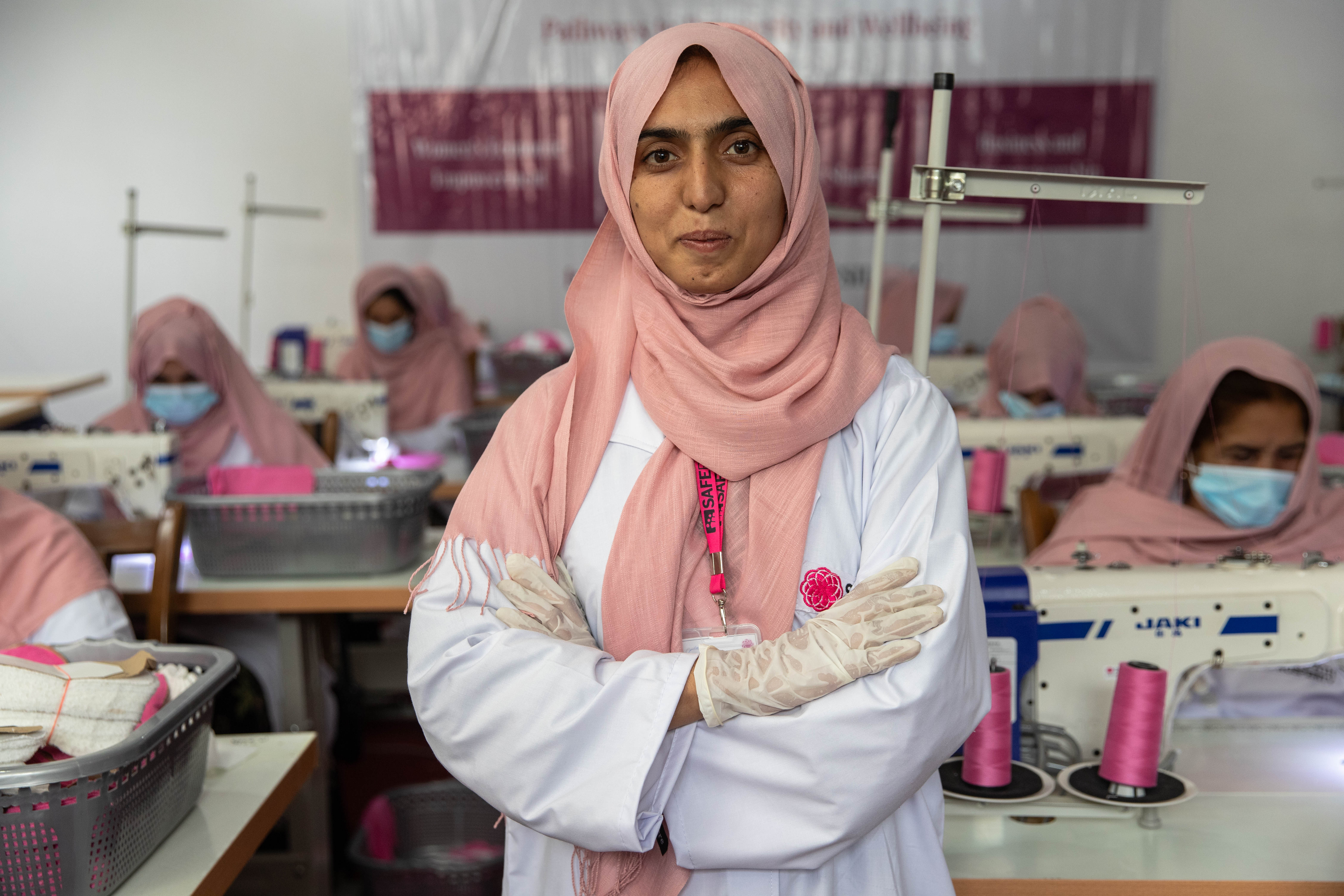
The issue of period poverty was a significant barrier. Many girls missed school during their periods, leading to a cycle of missed opportunities. Additionally, there was a prevailing mindset in some communities that girls were ready for marriage once they reached a certain age. We aimed to shift this perspective.
SPP was officially founded in 2020 and by February 2021, the Kabul Production Center employed 15 women to create high-quality, reusable hygiene products. Our mission is to promote gender equality, women’s empowerment and social inclusion through sustainable job creation and employment, MHM awareness, and increased access to educational opportunities and health services. Early on, I had the chance to meet with key figures, including UNICEF and MSI Afghanistan, who all supported our initiative.
WLP: Your organization has ambitious goals, aiming to provide women and girls with access to both educational and economic opportunities. How do you see menstrual health, which might seem like a marginal issue to some, fit into these larger objectives?
Zala: Yes, addressing menstrual health is challenging but it is a critical health issue for women and girls. UN agencies, including UNICEF and UNFPA, and non profit organizations, such as MSI Afghanistan, are among the top organizations that focus on MHM through their initiatives across Afghanistan. Initially, our focus was primarily on promoting girls’ education through increasing access to information and menstrual products. In Afghanistan, 50% of girls don’t even understand what is happening to their bodies when they get their first period and more than 30% do not attend school while on their periods. Every girl has the basic right to this knowledge.
I met with gynecologists in Kabul who emphasized the health implications of this lack of knowledge and proper resources such as a high quality sanitary pad. What was interesting for me and I learned as I spoke with more girls and women that factors like poverty and low literacy rates also play a significant role [in period poverty], as do unequal family dynamics. In many Afghan families, men are the primary decision-makers and they often do not see the value in investing in menstrual health products. Poverty means that families prioritize basic life necessities and immediate needs over menstrual health resources.
This leads to poor management of menstrual health, which can result in severe health complications. If families lack the understanding or ability to invest in this area, it adds to the cycle of girls being married off at a young age instead of continuing their education. I’m not saying that is the only reason, there are so many factors, but it is an important one where we can have an impact.
This further helped me and our team realize how important it is to invest in MHM in rural areas in Afghanistan and to ensure that the girls have access to these products and that we raise awareness among communities on MHM.
When we launched our work in 2021, my primary goal was to promote girls' education through access to quality products and information. But the political landscape has shifted. Our focus has evolved. Right now, creating dignified job opportunities for women has become our top priority, though we still continue focusing on raising awareness on MHM and partnering with organizations to include menstrual products in their hygiene and dignity kits.
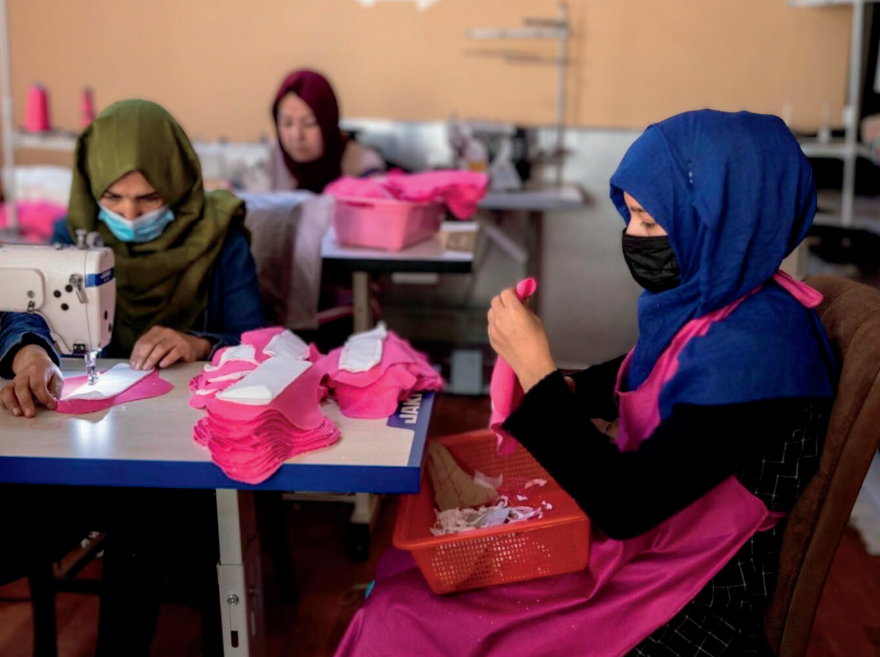
In 2023, we expanded to another province in collaboration with UN Women, employing over 50 women who are sole earners for their families and providing educational and health resources to over 300 female youth, primarily former university or high school students. They come to our centers for awareness programs on menstrual health and hygiene, gaining access to vital information in a safe space.
WLP: Can you tell us more about how Safe Path Prosperity supports the emotional and mental well-being of the women and girls who participate in your programs, and what the role of community plays in their overall experience at the center?
Zala: Our commitment to creating safe civic spaces for women is called Salamati Circle - which translates into Well-being Circle - safe spaces for women and girls to come together, work, learn, and share experiences. They are engaged in educational, health and social activities at these centers that have become crucial for their emotional well-being. While income is essential, many women express that the community and the sisterhood bond they find at our center is everything to them.
When we recently offered a week off for the Eid holidays, many women requested to come to the center anyway. Most are widows or from socially and economically vulnerable backgrounds, and being at home only worsens their stress. In our centers, they can escape their worries, engage with others, and focus on their goals and well-being.
We've also developed a curriculum called the Salamati Curriculum, which focuses on four main components: sexual and reproductive health, mental and emotional health, MHM, and business skills. This curriculum aims to raise awareness and educate women on these issues.
WLP: Based on what you have shared about your powerful work, how does your organization include female youth? Are they active participants in your work, or are they primarily your audience?
Zala: Afghanistan has a passionate and educated group of young women at home, eager for learning and engagement. Our approach includes offering jobs in our production center to women who need it most—those who are the breadwinners for their families.
In addition to employment, we hold awareness programs at our center. Currently, we have 100 youth participating in our center in Kandahar, who attend awareness sessions twice a month. We provide them with a stipend of $40, which helps with transportation and internet access. This involvement keeps them active and engaged, empowering them to become leaders.
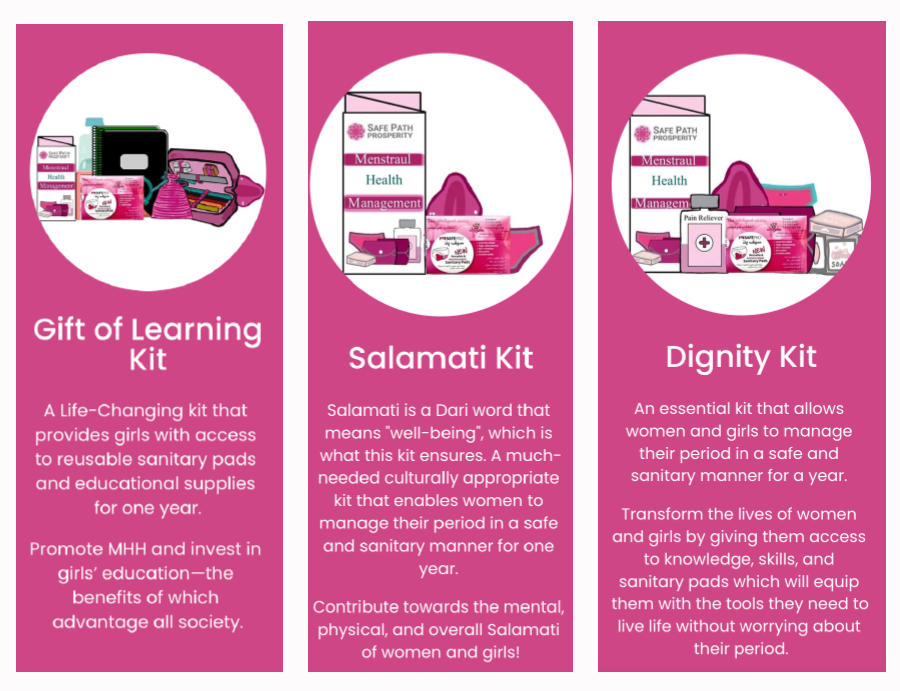
They also conduct their own community awareness sessions, reinforcing their leadership skills and long-term resilience. For example, last month, a group of five youths organized a session that successfully gathered 78 women to discuss MHM, and SPP provided our “Salamati” kits—essential hygiene products that support their health and dignity.
I am also proud to announce that we are launching the Salamati app in October, which will create a virtual space for youth to share, learn, and access resources. And those using the app can also share knowledge with their mothers, aunts, and other women in their communities who may not have the same opportunities.
Overall, our aim is to give these youth hope, build resilience and confidence in the face of challenges, and help them stay engaged and hopeful. This active engagement boosts their confidence and fosters a life of purpose and dignity, which is at the core of our mission.
WLP: What advice would you give young women and girls in similar circumstances who want to make a difference and start their own initiatives?
Zala: I would emphasize hope. Even during difficult times, the best initiatives emerge because that’s when people need support most. It’s crucial not to lose hope.
The bravery and resilience of women and girls working in our centers keeps me motivated. Many women working in our centers face tremendous hardships at home and beyond, but are determined and resilient and do what they can to create a better life for their children. The minimal income these women earn in our centers changes their life for the better. We often underestimate the impact of small initiatives - sometimes it starts with changing one life - it will amplify itself.
As an Afghan and a woman who worked for many years on girls’ education and women’s economic empowerment, I feel a sense of obligation and responsibility, and it is hard to sit back and not do something while I can. That is my message to every girl and woman out there, to contribute in any capacity they can.
It's also essential to be mindful of the political landscape and community attitudes. Respect and understanding the local context are critical to effectively and sustainably implement initiatives targeting women and girls in Afghanistan, in particular rural regions.
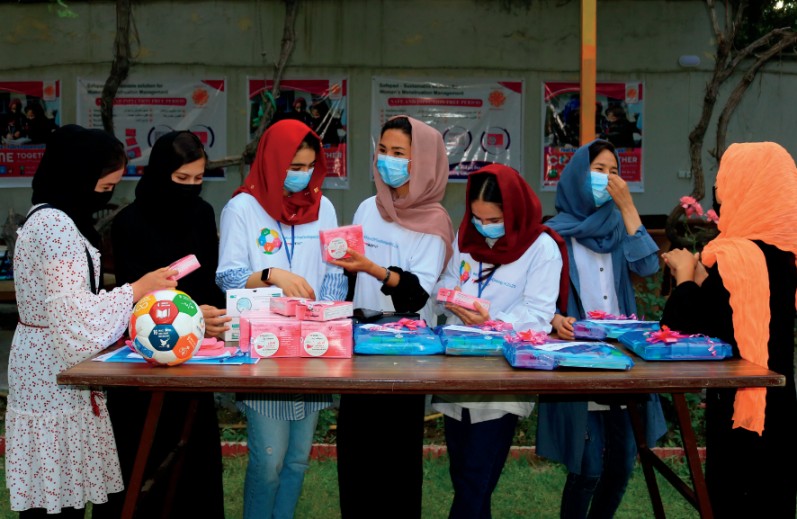
WLP: Many women and girls are facing immense pressures right now in Afghanistan. What message do you want to share about their resilience during these times of crises?
Zala: Afghan women have always had to be resilient. Often facing discrimination either within the family or the public sphere, women have learned how to make the most of their circumstances within the structures and constraints of Afghan society. Whether they fight for their daughter’s education or struggle against forced marriages, domestic abuse and decisions made without their consent, their economic empowerment is paramount to their success.
I want to return to my message of hope, a message that is deeply personal to us, the women of Afghanistan. We are resilient, and even in the face of overwhelming challenges and uncertainty, we must hold onto that hope. It is our strength that will guide us through, as we continue to fight for a life of dignity and prosperity. Together, we can find our way.
WLP: Thank you, Zala, for taking the time to share your inspiring work with us.
To learn more about the work of Safe Path Prosperity and support their work to empower women and girls in Afghanistan, visit their website at: https://www.safepathprosperity.org/
Related Content
The Scariest Part of this Halloween? The Rise of Authoritarianism Haunting the World
As Halloween fills the streets with goblins, ghosts, and witches, an even more sinister specter looms on the global stage—the surge of authoritarianism. This season, the chills don’t come from haunted houses but from a dangerous trend sweeping across nations, threatening freedoms, human rights, and especially women’s rights.
Asmae Aboulfaraj Shares Her Inspiring Journey for Achieving Gender Justice in Morocco
WLP’s partner in Morocco, the Association Démocratique des Femmes du Maroc (ADFM), has been leading an intergenerational movement to reform Morocco’s Family Code, the Moudawana, since 1985. We sat down with ADFM board member Asmae Aboulfaraj, a young feminist activist dedicated to advocating for reforms in the parts of the Moudawana that fall short of the country's constitutional commitments to gender equality. In this interview, Asmae shares her vision for collaboration between activists and civil-society organizations in Morocco and what she thinks the next generation of leaders can do to advocate for a better future for both women and men.